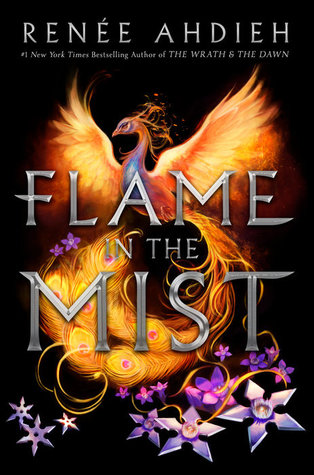Perhaps the forest simply knew this was where someone like Mariko - a lost girl in search of a place to call home - could plant roots and flourish
At just seventeen years old, Mariko is sent to the imperial palace to meet her betrothed, a man she did not choose, for the very first time. But the journey is cut short when Mariko’s convoy is viciously attacked by the Black Clan, a dangerous group of bandits who’ve been hired to kill Mariko before she reaches the palace.
The lone survivor, Mariko narrowly escapes to the woods, where she plots her revenge. Dressed as a peasant boy, she sets out to infiltrate the Black Clan and hunt down those responsible for the target on her back. Once she’s within their ranks, though, Mariko finds for the first time she’s appreciated for her intellect and abilities.
* * *
3 / 5
Flame In The Mist is the latest book by the author of The Wrath and The Dawn, which I really enjoyed and do recommend. This book is very loosely a Mulan retelling in which Mariko, daughter of a noble house, is attacked by bandits on her way to marry the second in line to the emperor's throne. Lost in a creepy forest, Mariko cannot return home in shame and so endeavours to infiltrate the Black Clan, who she believes is responsible for her attempted murder.
The first thing I noticed is that, whilst like in The Wrath and The Dawn the prose is lovely and descriptive and transport, the whole thing is written in incredibly short sentences. Seriously. The novel reads. Like. This. With periods in. Completely weird. Places for dramatic. Effect. Once I noticed this it became very difficult to ignore and genuinely impacted on my enjoyment because I was just going huh, another short one, and another one, ooooh a connective, which was such a shame. There's also a ton of line breaks, for example:
She returned his embrace. Returned each of his kisses. Every touch. Until nothing at all existed between them.
But shared breaths.
And unspoken promises.
Lies.
And unshakeable truth.
Really? Was it really necessary to write the whole book like this? Once or twice for dramatic effect, sure, but the whole thing is written this way.
Hattori Mariko was not just any girl. She was more.
This grievance aside, I liked every other aspect of the writing: the scene setting, most of the characters, the multiple POVs. We hear mostly from Mariko, but there's also the Emperor, Okami, a boy in the Black Clan, and Ranmaru the leader of the Black Clan, and Mariko's twin brother Kenshin who is tracking her across the country. The start of the book is pretty great, full of action and solidifying Mariko as a brave, cunning young woman; there's lots of great quotable lines here and she's got a subtle feminist vibe going, which was tastefully done.
When Mariko infiltrates the Black Clan the book gets a little slow and weird. I found it a little hard at first to tell the members of the clan apart: they're all young men with swords who look a mix of angry/sad/lazy/tragic/pretty and they all seem to have multiple nicknames and titles thrown around. They're also all weirdly philosophical. It's really bizarre. I'm doing my undergrad in joint honour philosophy so I love a decent philosophical discussion, don't get me wrong, it was just really odd, whilst Mariko genuinely thinks these men might kill her and has just seen a man die horribly in front of her, for her to be having discussions like:
"We are what we do." Though Okami's words sounded fierce, weariness tinged their edges.
"We are so much more than what we do!" Mariko drew closer, as if nearness could invoke a sense of truth. "We are our thoughts, our memories, our beliefs!"
And this was quite a reasonable discussion, there's lots more pseudo-discussion or "banterous quips" about honour, duty, truth, and freedom that got pretty grating as I was waiting for the action to get going again. Thankfully these bits were interspersed with Kenshin chapters where he hunted for his sister, to add a bit of excitement.
If I am marching to my death then I will march to it as a girl. Without fear.
I did genuinely enjoy most of Flame In The Mist. I was going to give it four stars before I remembered how annoying all the short sentences were and that Ahdieh leaves a lots of threads hanging: Mariko's relationship with her father, with her brother; the Emperor and his relationship with his wife and consort and his two sons and all of their respective plots; the Black Clan and what their goals are. There's a lot of ideas and threads in this book and not all of them are given due exploration and there's a lot dropped in right at the end to set up the next sequel, which I will almost definitely read.
I recommend this book for those that like Mulan (though this is a very rough retelling), 47 Ronin, Japanese-inspired settings, and badass female characters. It's a good, solid book, but unfortunately not a jaw-dropping one.


No comments:
Post a Comment